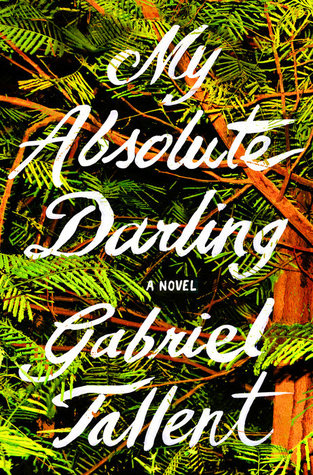In November, National Book Critics Circle members will begin nominating and voting for the John Leonard award for the first book in any genre that has been published in the US in 2017. In the run-up to the first round of voting, we'll be posting a series of #NBCCLeonard reviews on promising first books.
The John Leonard Prize is our annual award based on member nominations and chosen by a panel of member volunteers. Named for the longtime critic and NBCC co-founder, John Leonard, the prize is awarded for the best first book in any genre. Previous winners include: Anthony Marra’s A Constellation of Vital Phenomena (2013), Phil Klay's Redeployment (2014), Kristin Valdez Quade’s Night at the Fiestas (2015), and Yaa Gyasi’s Homegoing (2016).
 My Absolute Darling by Gabriel Tallent (Riverhead, 2017). Review by Brendan Driscoll
My Absolute Darling by Gabriel Tallent (Riverhead, 2017). Review by Brendan Driscoll
My Absolute Darling by Gabriel Tallent is a strange and intense novel that explores the potency of language, and by extension, the power of literature.
Fourteen-year-old Turtle Alveston loves her guns. On pegs on her bedroom wall rest her AR-10 and AR-15 assault rifles, powerful but heavy, and her reliable Remington twelve-gauge. On her body, more often than not, her Sig Sauer hides in its concealment holster. A significant portion of My Absolute Darling is devoted to describing Turtle’s firearms in various states of assembly and disassembly, readiness and action. Tallent revels in the poetry of firearms, describing their components in fine-milled detail: the slides and rails and takedown levers and polymer grips and hammer struts and recoil springs; the sidesaddle of the shotgun holding its line of extra ammunition; and the brass firing pin, removed and held between Turtle’s teeth. Each of her weapons, we are reminded, curiously, “answers a different philosophy of use,” as if each was an adjective laden with connotations.
Turtle is an excellent shot, trained by her father Martin, a rotted-out philosopher turned apocalyptic survivalist, who first put a bolt-action .22 in her hands at age six. Their decrepit house near Mendocino, California, is covered with shot-up targets and littered with shell casings. She’s always armed, except when she goes to the trailer out back to visit her alcoholic grandfather, “because Grandpa says that when a man plays cribbage with his granddaughter, the two of them should be unarmed.” But Turtle’s guns do not stop Martin from raping Turtle, or reminding her that he’d sooner see her dead than love anyone else.
Tallent’s descriptions of the lush, forbidding NorCal wilds Turtle roams, shoeless and armed, like all his descriptions, are strange, intense, and language-obsessed. Vegetation is described with abandon—bishop pine and huckleberry and Oregon grape and Douglas fir; stunted cypresses, sedges, pygmy manzanita and Bolander’s pines; rattlesnake grass and poison oak; watercress scavenged from ditches and thistles, ripped up and gnawed for their flavor—showing us the poetry of the woods while reminding us of Turtle’s skill as a master forager, “deciphering” plants in the darkness. The poetry, and the danger on the Pacific coast, “shining blue mussels [are] knurled to the rock like so many porcelain razors,” and the tide drains backward, “so the entire cove is filled with muddled, complicated currents” that suck Turtle underwater and beat her body against rocks “among lofted chandeliers of water and great, hanging tresses of blooming nasturtium.”
Miles into the forest, Turtle stumbles upon Jacob and his sidekick Brett, helpless intellectual adventurers bearing focaccia, Easy Cheese and weed, and saves them from hypothermia, if not worse. They tease Turtle about being a ninja, or perhaps a living Zen koan, talking “in a way that is alarming and exciting to her—fantastical, gently celebratory, silly.” Tallent elaborates, capturing the flare of a liberating (and, in this instance, potentially lethal) teenage crush in lexical terms: “To Turtle, slow of speech, with her inward and circular mind, their facility for language is dizzying. She feels brilliantly included within that province of things she wants, lit up from within by possibility….A new world is opening up for her.” Or, more darkly, consider all of the complexity contained within the single word “Kibble,” the pet name Martin gives his daughter: “kiddo” grafted onto “nibble,” cute, perhaps, connoting something tiny and edible, but, in context, horrific, a wounded predator likening his prey to dog food. Is it a coincidence that later, locked in combat with her father, Turtle’s throat is crushed in a way that renders her unable to speak?
Where Turtle has her guns, Gabriel Tallent has his words. Respectful of their power, Tallent deploys them with rifled precision, or in beautiful and bracing sprays of buckshot, but never carelessly and never without aiming. And nearly all the time, he hits his mark.
Brendan Driscoll's work has appeared in Booklist, The Millions, and other periodicals. He lives in Colorado.

